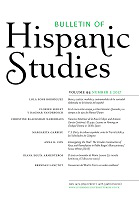
BULLETIN OF HISPANIC STUDIES
Scope & Guideline
Cultivating Knowledge in the Heart of Hispanic Scholarship
Introduction
Aims and Scopes
- Literary Analysis and Critique:
The journal emphasizes in-depth literary analysis, exploring various genres and periods within Hispanic literature, including canonical works and emerging voices. - Cultural Studies:
It investigates cultural phenomena, including film, art, and sociopolitical contexts, examining how these elements interact with literary texts and influence cultural identity. - Historical Contextualization:
The journal often situates literary works within broader historical narratives, analyzing the interplay between literature and historical events in the Spanish-speaking world. - Interdisciplinary Approaches:
The Bulletin encourages interdisciplinary research, integrating perspectives from fields such as history, sociology, gender studies, and cultural studies to enrich the understanding of Hispanic literature. - Emerging and Diverse Voices:
There is a commitment to highlighting diverse voices, including those from marginalized communities, thus broadening the scope of traditional Hispanic studies.
Trending and Emerging
- Posthumanism and Technology:
Recent publications increasingly address themes of posthumanism, exploring the intersection of technology and literature, and questioning human agency in the digital age. - Decolonial Studies:
There is a growing emphasis on decolonial perspectives, particularly in relation to the legacies of colonialism in Hispanic literature, highlighting voices and narratives that challenge dominant historical discourses. - Gender and Sexuality Studies:
The journal has seen a rise in contributions focusing on gender and sexuality, examining how these constructs are represented and negotiated within Hispanic texts. - Ecocriticism and Environmental Studies:
Emerging themes in ecocriticism reflect a heightened awareness of environmental issues within literary studies, linking ecological concerns with cultural narratives across the Hispanic world. - Transnational and Migratory Narratives:
Increasingly, the Bulletin showcases works that explore transnational identities and migratory experiences, reflecting the complexities of globalization and cultural exchange.
Declining or Waning
- Traditional Canonical Works:
There appears to be a reduction in articles focused solely on traditional canonical texts, as the journal increasingly prioritizes contemporary literature and diverse voices. - Nationalistic Narratives:
Themes centered on strict nationalistic interpretations of literature are becoming less frequent, possibly indicating a shift towards more transnational and global perspectives. - Historical Biographies:
Papers solely dedicated to biographical studies of historical literary figures have decreased, reflecting a broader trend towards thematic and theoretical analyses over individual life narratives. - Classical Literary Forms:
There is a noticeable decline in the exploration of classical literary forms, such as epic poetry and traditional dramas, as contemporary and experimental forms gain more attention.
Similar Journals
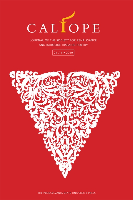
Caliope-Journal of the Society for Renaissance and Baroque Hispanic Poetry
Illuminating the Beauty of Hispanic Literary TraditionsCaliope: Journal of the Society for Renaissance and Baroque Hispanic Poetry is a prestigious academic journal published by Penn State University Press, dedicated to exploring the rich tradition of Hispanic poetry from the Renaissance and Baroque eras. With an ISSN of 1084-1490 and an E-ISSN of 2377-9551, this journal serves as a vital resource for scholars and enthusiasts of the field, particularly within its converged years of 2019 to 2023. Ranking in the Q2 and Q3 quartiles across various categories such as History, Literature and Literary Theory, and Linguistics, Caliope has positioned itself as a significant contributor to the academic discourse surrounding Hispanic poetic traditions and their historical context. While the journal is not currently open access, it provides in-depth analyses and innovative research that are crucial for both current scholars and future researchers in the humanities. Engage deeply with the rhythmic and cultural expressions of a transformative period in literature and join a community that values the intricate beauty and societal reflections of Renaissance and Baroque Hispanic poetry.

Monteagudo
Unveiling Emerging Ideas in Arts and HumanitiesMonteagudo, published by UNIV MURCIA, is an important academic journal dedicated to the fields of Arts and Humanities, particularly focusing on Literature, Literary Theory, Visual Arts, and Linguistics. Since its inception in 2019, it has aimed to provide a scholarly platform for innovative research and critical discourse within these disciplines. With an ISSN of 0580-6712 and an E-ISSN of 1989-6166, the journal seeks to enhance the visibility of emerging ideas and methodologies, while fostering an inclusive academic dialogue. Although Monteagudo does not currently offer Open Access options, its significance is reflected in its Scopus rankings, which position it within the 14th to 32nd percentile across various categories. With its operations based in the heart of Murcia, Spain, the journal is poised to influence both regional and international scholarly conversations, making it an essential resource for researchers, professionals, and students aiming to expand their understanding of contemporary issues in Arts and Humanities.
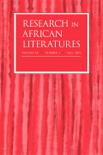
RESEARCH IN AFRICAN LITERATURES
Fostering Interdisciplinary Insights in African StudiesRESEARCH IN AFRICAN LITERATURES is a prestigious peer-reviewed journal published by Indiana University Press, dedicated to the critical exploration of African literary traditions, cultures, and texts. With an ISSN of 0034-5210 and an E-ISSN of 1527-2044, this journal stands out in the field of literature and literary theory, currently ranking in the 80th percentile of its category according to Scopus, making it a significant platform for scholars and researchers alike. Since its establishment, the journal has evolved through converged volumes from 2002 to 2024, consistently fostering innovative discourse and interdisciplinary approaches that illuminate the complexities of African narratives. Although it does not offer open access, the journal is integral for anyone engaged in African studies, providing critical insights that are essential for understanding the broader implications of literature within diverse cultural contexts. The journal's commitment to high standards of scholarship is reflected in its Q3 quartile ranking and its influential contribution to contemporary literary dialogue.

CELEHIS-Revista del Centro de Letras Hispanoamericanas
Fostering Dialogue in Latino Literary StudiesCELEHIS-Revista del Centro de Letras Hispanoamericanas is an esteemed academic journal dedicated to the exploration and dissemination of research in the field of Hispanic literature and cultural studies. Published by the UNIV NAC DE MAR DEL PLATA-CENTRO LETRAS HISPANOAMERICANAS, this journal has embraced open access since 2014, making its rich repository of scholarly articles available to a global audience. The journal aims to foster knowledge and dialogue surrounding the diverse literary expressions of Hispano-American cultures, providing insights that are crucial for researchers, professionals, and students alike. With its commitment to scholarly excellence, CELEHIS plays a significant role in enhancing the understanding and appreciation of Latino literature, while encouraging interdisciplinary collaboration and critical discourse within the academic community. Located in Mar del Plata, Buenos Aires, Argentina, it stands as a crucial platform for voices in the field, facilitating a deeper engagement with the literary heritage of the Spanish-speaking world.
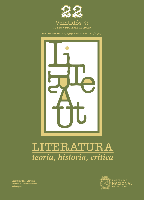
Literatura-Teoria Historia Critica
Bridging Past and Present in Literary ScholarshipLiteratura-Teoria Historia Critica is a distinguished open-access journal published by UNIV NAC COLOMBIA, FAC CIENCIAS HUMANAS, that has been at the forefront of literary scholarship since its inception in 2004. With an ISSN of 0123-5931 and E-ISSN of 2256-5450, it provides an invaluable platform for researchers, professionals, and students in the field of Literature and Literary Theory. The journal's significance is underscored by its remarkable placement in the Q1 category within its field in the year 2023, as well as its Scopus ranking of #556 out of 1106 in Arts and Humanities, highlighting its influence and reach. The journal aims to foster academic discourse by publishing high-quality research articles that scrutinize literary texts, theories, and histories, facilitating a deeper understanding of literature's role in society. With a commitment to accessibility and scholarly rigor, Literatura-Teoria Historia Critica is an essential resource for those seeking to enrich their knowledge and engage with contemporary literary debates.

ENGLISH LANGUAGE NOTES
Exploring the Depths of English Literature and TheoryENGLISH LANGUAGE NOTES is a premier journal published by the University of Colorado, dedicated to the field of literature and literary theory. With a strong impact in academia, it holds a prestigious Q2 ranking in the 2023 category, emphasizing its importance among scholarly publications. The journal, indexed under ISSN 0013-8282 and E-ISSN 2573-3575, has been a crucial resource since its inception in 1969, featuring converged years from 1969, 1977, and 1982, through to 2024. The editorial board promotes rigorous scholarship and encourages contributions that explore the complexities of the English language across diverse literary contexts. While it does not offer open access, ENGLISH LANGUAGE NOTES remains a vital source for researchers, professionals, and students invested in the sustained exploration of literary arts, evidenced by its strong Scopus ranking in the 79th percentile in its field. For those committed to advancing literary scholarship, this journal serves as an invaluable platform for discussion and dissemination of influential ideas.
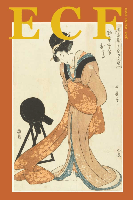
Eighteenth-Century Fiction
Connecting Past and Present Through Eighteenth-Century FictionEighteenth-Century Fiction is a premier academic journal dedicated to advancing the study of literature from the eighteenth century, publishing innovative research that contributes to understanding the cultural and historical contexts of this dynamic period. Published by University of Toronto Press, Inc., this journal boasts an impressive Q1 categorization in the field of Literature and Literary Theory, reflecting its significant impact on discourse among scholars. Since its inception in 2002, the journal has provided a platform for interdisciplinary exploration and critical analysis, appealing to researchers, professionals, and students alike. With an ongoing commitment to quality and scholarly excellence, Eighteenth-Century Fiction serves as an essential resource for those seeking to delve into the literary innovations and societal transformations of the eighteenth century. Access to its rich collection of articles ensures that the academic community remains engaged with emerging trends and pivotal research in this vital area of study.

REVELL-Revista de Estudos Literarios da UEMS
Illuminating New Paths in Literary ResearchREVELL-Revista de Estudos Literarios da UEMS is an esteemed open-access journal dedicated to the field of literary studies, published by Universidade Estadual de Mato Grosso do Sul. Since its inception in 2010, this journal has served as a crucial platform for scholars and researchers, fostering the dissemination of innovative research and critical discourse within the field of literature. The journal aims to promote rich interdisciplinary perspectives, making it an essential resource for academics, professionals, and students alike who are engaged in literary analysis and theory. Housed in the vibrant academic community of Brazil, REVELL upholds a commitment to excellence and accessibility, encouraging widespread scholarly participation and engagement across various literary topics. With an ISSN of 2179-4456, researchers can readily explore the evolving landscape of literary studies through its comprehensive and insightful publications.
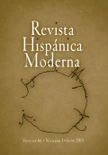
Revista Hispanica Moderna
Advancing Understanding of Hispanic Cultural IdentitiesRevista Hispanica Moderna, published by University of Pennsylvania Press, is a scholarly journal dedicated to exploring the rich tapestry of Hispanic cultural, historical, and literary studies. With an ISSN of 0034-9593 and an E-ISSN of 1944-6446, this esteemed publication operates within the United States, ensuring a broad international reach. While it currently does not offer Open Access, the journal provides significant insights across diverse fields, categorized as Q4 in Cultural Studies, History, and Literature and Literary Theory as per the 2023 standards. Although the journal ranks in the lower quartiles of its fields, its systematic approach to modern Hispanic studies offers valuable opportunities for gaining perspectives that are often underrepresented. Researchers, professionals, and students are encouraged to engage with its content as it navigates the complexities of cultural identities and historical narratives from 2019 to 2024 and beyond, making important contributions to the ongoing discourse in the humanities.
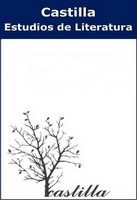
Castilla-Estudios de Literatura
Innovating Literary Scholarship for a New Era.Castilla-Estudios de Literatura is an esteemed academic journal published by EDICIONES UNIV VALLADOLID, dedicated to the exploration and analysis of literature and literary theory. With an ISSN of 1989-7383 and an E-ISSN of 1989-7383, this journal has provided Open Access content since 2009, ensuring wide accessibility to its scholarly materials. Hailing from Spain, specifically based at JUAN MAMBRILLA 14, VALLADOLID 47003, SPAIN, it has become a notable platform for researchers and scholars, achieving a respectable Q3 ranking in the 2023 category of Literature and Literary Theory, along with a Scopus rank of #637 out of 1106 in the Arts and Humanities. Covering a converging period from 2013 to 2024, this journal embraces a diverse range of literary analysis, aiming to foster critical discourse among academics, professionals, and students globally. Its commitment to high-quality research and open dissemination makes it an invaluable resource for those engaged in the literary field.